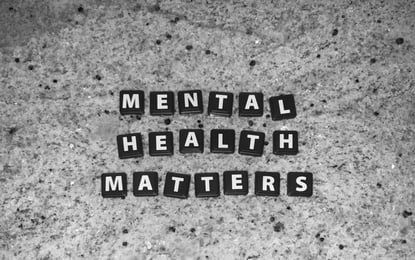Mental health is a serious topic and is often avoided in the workplace because it’s hard to talk about. As a result of this, by the time many employees approach their employers about their mental health conditions, they’ve often become debilitating.
I am not a mental health professional, just a long-time sufferer of mental illness. I hid this facet of myself for so long - as a white woman in a place of immense privilege, I felt as if my declining mental health was unjustified. I didn’t feel like I deserved to speak up as so many people had it worse. Eventually, my depression grew out of control, destroying my ability to work, and putting me in a position where my leads at Airship noticed I was underperforming. When my bosses approached me about the decline, the dam broke, and everything I was experiencing came pouring out of me. At that point, they set up a plan to help get me back on track, hopefully alleviating many of my stressors and opening a door to honest, authentic communication.
Thankfully, I’m doing better now. And I realize how fortunate I am to work for such an incredible company that truly puts its people first. Being honest about my depression the first time wasn’t easy, and it still isn’t always. Now though, in periods of decline, I feel empowered to come forward with my struggles before they overtake me. Of all the things I’ve learned from this experience, I wish I would have realized that I could have reached out sooner - long before my depression overtook my capacities and Airship’s faith in me.

Mental Health in Tech
Mental health issues in the world are rampant, regardless of whether or not we are willing to discuss them as a society. In fact, up to 80% of people will experience a diagnosable mental health condition in their lifetime, even if they’re not aware of it. Depression is so prevalent in our working society that it ranks among the top three workplace problems, following only family crises and stress.
While mental health can affect anyone in any career, it seems to lay an extreme burden on the tech community. For instance, of the 80,000 devs that responded to the 2021 Stack Overflow Developer Survey, over 16,000 deal with a mental health condition – that’s over 20% of respondents that suffer from mental illness. In another clinical study performed in Japan on psychiatric disorders in men in tech, it was found that 32% of the participants in the study met the clinical diagnostic criterion for major depressive disorder.
The tech sector sees such a high number of mental illnesses for a slew of reasons:
- It’s a mostly solitary career – while you do communicate with your team, the majority of the work is done without emotional human interaction. Even for introverted people, solitary work can lead to feelings of loneliness – which research shows can have the same impact on mortality as smoking 15 cigarettes a day. (!!!)
- It also has a tendency to keep most of us sedentary, which many studies link to the development of mental health disorders.
- Long hours of screen time associated with our jobs during our working hours are also known to disrupt many facets of our sleep, which is also believed to be linked to severe bouts of depression.
- And as if that wasn’t enough, our jobs themselves can be highly stressful. They’re teeming with tight deadlines, ever-changing technologies, the constant ping of Slack and email, the inability to focus due to constant interruptions… all of which induce stress – one of the leading causes of anxiety, depression, and burnout.

Looking Inward
So, you work in tech – or another mental illness-ridden field – and you’re starting to wonder… What if that’s me? Well, oftentimes, admitting you “have a problem” can be the hardest step to take. A pervasive internalized stigma may tell you that you’re weak and should be ashamed – but those feelings are actually rooted in a deeply ableist society – one that lends itself to discrimination and the perpetuation of negative stereotypes. But there are several things you can do at this point to prevent further deterioration of your mental psyche.
Work on becoming self-aware
You don’t need a diagnosis to recognize that your mental health is worsening. At the same time, it’s easy to tell yourself it could be worse and continue to ignore your declining mood and mental state. Many people don’t think they can reach out for help until things get really bad, but that’s not true.
There are so many early signs that you can watch out for which can help make your journey so much easier. Look for things like unexplainable irritability, exhaustion despite more than adequate sleep, changes in appetite, the feeling of needing to ‘force’ happiness so others don’t notice you’re struggling, brain fog and trouble concentrating, headaches, or a disinterest in things you normally enjoy.
Take time to reflect on how your mental health effects your performance, demeanor, and life.
Olivia Klohr
When my depression first started taking over my life, it was hard for me to see. I still went about my day as a mostly-functional adult, I just felt a little empty inside. By the time things had started to spiral out of control, the aforementioned feelings were crippling. I had immense anxiety over the simplest of tasks – things as simple as sending an email could be paralyzing – and I often found I couldn’t concentrate. I couldn’t think straight, so I couldn’t get anything done – which made me feel even worse – and only exacerbated the problem. It quickly became a vicious, seemingly inescapable cycle.
Taking steps to take stock of how your mental health affects your life is the first real step to determining if you’re in a small slump or if you need to be reaching out for help to conquer a longer battle.
Ask yourself the following questions:
- Have things changed recently to be triggering this - things like medications, life events, work?
- Have you been putting off seeing a therapist because of work conflicts?
- Are you overloading yourself with tasks, and could you benefit from the help of someone else to help you prevent anxious achievement?
- Or, is it just the state of your life right now?
There are no right answers to any of the above and you may not be able to answer them on your own, That’s okay. They’re just intended to serve as a stepping stone to help move you forward.
Learn your rights
In the US, businesses with 15 or more employees are required by law to provide reasonable accommodations for any disability, including mental health issues. Knowing your rights can make it easier to communicate your struggles, as it gives you the confidence that you will be protected.
Communication
Okay, you’re still here… which likely means your mental health is affecting your life more than you want it to, and you would like to discuss the matter with your employer. However, mental health stigma can be a barrier for employees who wish to talk openly about their treatment and condition. If this is you, you aren’t alone. Many people worry about losing their job, missing out on a promotion, or being unfairly judged by coworkers – solely for communicating their truth.
When preparing to have this conversation with your employer, determine how much you’re comfortable sharing. You don’t have to go into detail - it can be as simple as “I’m having a hard time with my mental health, and it’s affecting my work”. You can always elaborate more if you wish, but there is no “wrong” amount of information to give out.
Before approaching your employer, consider what resources you think might help you the most, and consider discussing them in your conversation. These resources could be things like flexing working hours to see a therapist, offline hours, protected time to work without interruption, or anything else you feel would help eliminate some of your stress. Sometimes, simply being heard by your employer can be enough, and that’s totally valid as well. If you’re in the deep, dark depths of your mental illness when you choose to disclose your struggle, consider talking through this part with a trusted friend, family member, coworker, or health professional. They can often help identify what they’ve seen you struggling with, and may be able to help you identify the matter of assistance you need.
Set up a conversation with your manager, HR department representative, or another manager you trust. Make it a private, one-on-one conversation, and schedule more time than you think you’ll need so you don’t have to rush. Be clear about the impact your mental health is having on your work – and if your work is the cause of your mental health issues, convey that too. This is also your chance to discuss the potential aids and solutions you think may be beneficial. Before your meeting ends, be sure to schedule a follow-up or two.
An incredibly important note – this conversation often ends up being as hard for your manager as it is for you. Try to accept your manager’s reactions with empathy and grace as they hear what you’ve been experiencing – this may be the first their hearing of your battle.
Your employer knows. Now you can take a breath. At this point, if you feel comfortable, consider sharing with your team, either now or at a later date. Someone else on your team might be struggling too, and knowing they’re not alone may serve as encouragement for them to seek the support they need.
Outcomes
You’ve had the conversation, you’ve scheduled your follow-ups, and hopefully, you’re beginning to receive the accommodations you need. When you speak out about your mental health in this way, you begin to foster a culture of compassion. A compassionate, empathetic culture is critical to elevating your organization to its highest performance level, even if it may seem counterintuitive to some.
The discussion of mental health in the workplace not only leads to a compassionate culture – it can help to foster a greater sense of diversity and inclusion. Mental health is an oft-forgotten DEI issue, as different populations are affected by mental health differently due to cultural norms and differences in stigma. Dismantling the stigma around mental health not only allows you to speak up it clears the air for those who may already feel underrepresented in your company, who may find it even harder to speak up about their mental health.
For an employer, a well-rounded DEI initiative should be more than enough to motivate an intentional reformation of the attitude around mental health. If it isn’t, here are a few other great reasons to do so:
- It encourages humble leadership. Oftentimes, high-ranking members of an org find themselves becoming overly obsessed with outcomes and control. As a result, they may unintentionally treat their employees as means to an end. This mindset creates fear and stress for employees – fear of not hitting targets, fear of failing, fear of repercussions for bad days. With a culture that intentionally empowers authentic and humble leaders, many of the aforementioned issues may be naturally mitigated on their own.
- It’s well known that good company culture is strongly correlated with employee happiness. And employee happiness has been known to create space for so many measurable improvements. Specifically, studies show that positive, culture-driven organizations experience 26% fewer mistakes, 22% higher productivity, 41% lower absenteeism, and 30% stronger customer satisfaction than those without. One field that readily embodies these benefits is the mental health sector. A 2021 study showed that when employees feel comfortable talking about their mental health at work, they’re more satisfied with their jobs and demonstrate higher employee retention.
Remember the following:
At the end of the day, being open and honest about your mental health helps build a culture that doesn’t just meet the demands of crises, but rather creates a workplace where everyone thrives. Dismantling the stigma around mental health discussion starts with those of us directly affected by it, but it’s still a terrifying discussion to have. Whether or not you choose to disclose to your employer is completely up to you. There isn’t a right answer - and you aren’t failing those around you by keeping your mental health private. At the end of the day, the most important part of this article… is you. So, if you take away nothing else:
*YOU ARE NOT ALONE.* With up to 33% of the tech industry suffering from a mental health condition, you’re likely working with others who empathize with your struggle.
*YOU ARE NOT LESS.* It isn’t your fault that you have a mental health condition, and you are not worth less than those around you that don’t struggle with one.
*YOU ARE NOT BROKEN.* Everyone struggles with something. If mental health is your something, that’s a-okay. You’re not “a mess” or “broken”, whether your condition is situational or a chemical imbalance in your brain that doesn’t always play nice.
*YOU ARE VALUABLE.* Even when you struggle with things, you are still immensely valuable – both as an employee and as a person.


